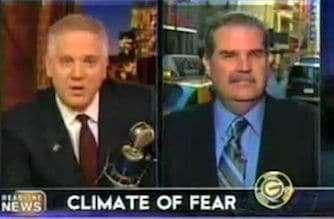Last week, the leading climate skeptic blogger Anthony Watts criticized my writing based upon my age and looks–and other, er, observations:
For the record, it is now official; Chris Mooney is a paid political hack disguising himself as a science writer. I’m going back to calling him a “kid blogger”, because no adult could have thought processes that give conclusions like this.
With this, Watts posted a picture of what I look like. I’m 34.
I would like to note some reasoning fallacies here. First, there is the obvious ad hominem fallacy—trying to discredit my intellectual arguments by saying negative personal things about me. Relatedly, Watts is also poisoning the well—he throws in these negatives before beginning to evaluate any argument, thus biasing readers against me before they actually assess evidence or claims.
There is also another fallacy here that conservatives, in particular, tend to commit—indeed, it pervades their view of issues like welfare policy. It’s called the fundamental attribution error, and it entails attributing someone’s behavior to something inherent in them (why doesn’t that lazy poor person try harder to get a job), rather than to the situation in which they find themselves (debilitating conditions of poverty). Thus, e.g., I make dumb arguments because I’m young and don’t know any better.
Why is this argument invalid?
Simple: Even if I do make dumb arguments, it does not follow that my age is the cause of my behavior. There are most assuredly 34 year old climate skeptics out there who would happily make the arguments that Watts wants to hear. Moreover, there are senior, older climate scientists—many, many of them—who would call my statements scientifically accurate.
So what can Watts really hope to prove by talking about my age? It’s hard here, incidentally, not to think of Jonah Goldberg’s claim that conservatives should “beat” the socialism out of the youth these days–and that we should raise the voting age because the kids are so dumb.
[As for “paid political hack”—is this supposed to mean that I do political consulting or strategy work? I do not. And “science writer”? In 2009, the American Meteorological Society gave me a book award for writing “an accurate and comprehensive overview of the evolving debate on the impacts of global warming and hurricanes that illustrates the complexities of this significant scientific problem.” So my science writing has been assessed well by…scientists. I write about politics, too, obviously, and always have.]
An interesting question is what triggered this. The answer is that it was my writing about all the latest extreme weather in the context of climate change. I made some mild and quite scientifically supported statements—simply noting that climate change has made the latest extreme heat more likely by loading the dice, but also noting that we could easily roll a cold winter later this year…and then discussing all the politics of this.
Everybody’s writing similar stuff; everybody’s pointing out that this is what global warming looks like—welcome to the rest of our lives–and we are even getting past once-obligatory but often misleading disclaimers about the difference between weather and climate. It is in this context (situational) that Watts makes his claim that, in essence, he’s right because he’s older than me.
I can certainly see how this context—this news cycle—would be threatening to climate skeptics. People are actually starting to see that global warming is changing the world in a way that we don’t like. Major media, especially television, are starting to cover this reality. I fully expect that we will see measurable impact on public opinion from all of this—and perhaps the skeptics do as well.
So perhaps derogating sources of inconvenient information–in this case, me–is to be fully expected in this context.
In any case, you can read Watts’ comments for plenty more attacks. If I had to name a fav, it would be this one:
Frame Mooney’s piece and hang it on the wall as a horrible reminder of a brain not fit for use as a doorstop.
Ouch.
In conclusion, I want to say something on the topic of youth, age, and conservatism. This reflection is prompted both by Jonah Goldberg’s “beat the socialism out of them” comment–which, hilariously, led the comedian Jamie Kilstein to challenge Goldberg to a fight, something we discussed on the latest Point of Inquiry–and now Watts’ age-related remarks.
The left-right battle between rebel youth and tut-tutting elders is, surely, as old as we are. It is a human tradition and a human constant that some young people, wanting to explore, wanting to be different, challenge received wisdom and the older generation. And that, ironically, is precisely why conservatives ought to embrace this dynamic and have much more respect for young people: Because young people challenging old people is part of who we are–our fundamental heritage. Isn’t our heritage something conservatives are supposed to defend and even, perhaps, worship?
I realize, though, that in writing this post I am only a kid–so I may be missing something. If so, I’m sure all the grown-ups who are reading will point it out.
Subscribe to our newsletter
Stay up to date with DeSmog news and alerts






